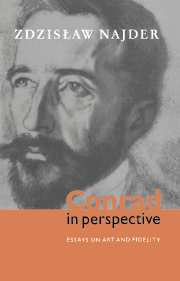Book contents
- Frontmatter
- Contents
- Acknowledgements
- Note on the texts
- List of abbreviations
- 1 Introduction, or confession of a mastodon
- 2 Conrad's Polish background, or from biography to a study of culture
- 3 Joseph Conrad's parents
- 4 Joseph Conrad and Tadeusz Bobrowski
- 5 The Sisters: a grandiose failure
- 6 Lord Jim: a Romantic tragedy of honour
- 7 The Mirror of the Sea
- 8 A Personal Record
- 9 Joseph Conrad's The Secret Agent, or the melodrama of reality
- 10 Conrad, Russia and Dostoevsky
- 11 Conrad and Rousseau: concepts of man and society
- 12 Conrad and the idea of honour
- 13 Joseph Conrad: a European writer
- 14 Joseph Conrad after a century
- 15 Joseph Conrad in his historical perspective
- 16 Fidelity and art: Joseph Conrad's cultural heritage and literary programme
- Notes
- Index
7 - The Mirror of the Sea
Published online by Cambridge University Press: 07 December 2009
- Frontmatter
- Contents
- Acknowledgements
- Note on the texts
- List of abbreviations
- 1 Introduction, or confession of a mastodon
- 2 Conrad's Polish background, or from biography to a study of culture
- 3 Joseph Conrad's parents
- 4 Joseph Conrad and Tadeusz Bobrowski
- 5 The Sisters: a grandiose failure
- 6 Lord Jim: a Romantic tragedy of honour
- 7 The Mirror of the Sea
- 8 A Personal Record
- 9 Joseph Conrad's The Secret Agent, or the melodrama of reality
- 10 Conrad, Russia and Dostoevsky
- 11 Conrad and Rousseau: concepts of man and society
- 12 Conrad and the idea of honour
- 13 Joseph Conrad: a European writer
- 14 Joseph Conrad after a century
- 15 Joseph Conrad in his historical perspective
- 16 Fidelity and art: Joseph Conrad's cultural heritage and literary programme
- Notes
- Index
Summary
Conrad's first volume of essays, The Mirror of the Sea: Memories and Impressions, published in 1906, garnered immediate eulogies in the letters he received after its publication from Bennett, Galsworthy, Henry James, Kipling and Wells – it has not, however, attracted much critical attention since. This is a pity, since the collection offers valuable insight into the workings of Conrad's mind and writing method. While the best overall assessment remains that by Morton Dauwen Zabel in his Introduction to The Portable Conrad (New York 1947), the only comprehensive critical studies devoted especially to The Mirror are in Polish and in French.
To appreciate it fully, it is best to read The Mirror not knowing, or else forgetting, how the volume originated and its parts were assembled: simply, to read the book as a whole.
Ostensibly, this is a collection of ‘memories and impressions’, as its subtitle says, concerning the sea; and the most obvious understanding of the title is probably that the author intends to hold to the sea the mirror of his prose. But, as often in Conrad's works, the title has another and more important meaning. The sea may be understood as being itself a mirror. The motto, from Boethius' On the Consolation of Philosophy – a book in praise of philosophical thinking – seems to enforce this interpretation. The motto talks about a ‘miracle or wonder’ (there is here a hidden allusion to the title, as both ‘mirror’ and ‘miracle’ come from the same Latin miraculum) which ‘greatly troubles’ the author. But what is the sea a mirror of? Perhaps of Nature in general, of the universe.
- Type
- Chapter
- Information
- Conrad in PerspectiveEssays on Art and Fidelity, pp. 95 - 101Publisher: Cambridge University PressPrint publication year: 1997



